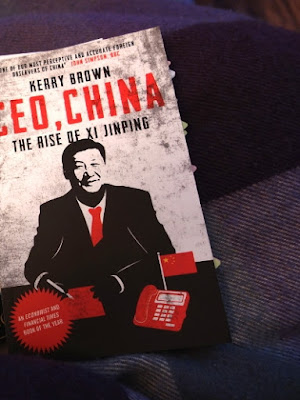CEO, China: The Rise of Xi Jinping - Thoughts & Review, Part 1
"What do you know about the man who runs China?" the blurb demanded.
"Nothing," I blinked. Well, basically nothing.
I couldn't believe it...I knew basically nothing about Xi Jinping, one of the most powerful leaders in the world today. (I also have some Chinese heritage, which makes it even more embarrassing.)
Xi, in fact, may wield more influence than any other secular leader. He functions not only as General Secretary of the Communist Party of China (CPC) but also as their "core leader" - putting him in the same league as Mao. In parallel, he shows the other communist nations (nominally very few) what a strong communist leader looks like. With a GDP on track to overtake the United States' in the next decade, China's version of socialism is not to be ignored, and Xi is well placed to be more than just a figurehead.
Search Amazon for "xi jinping biography" and relatively few books come up. Remove the word "biography" and the results are better, though apparently little read, if we go by the number of reviews. If Xi is so important, why do we in the West talk so little about him as opposed to, say, Putin? The mystery in my mind was growing as I picked up Kerry Brown's biography, boldly titled CEO, China: The Rise of Xi Jinping.
Politics, Ideology, and - Religion?
As a professor, writer, and former diplomat to China, Kerry Brown brings a well-rounded perspective to his biography of Xi. This book covers a vast amount of material beyond the chronology of Xi's life, which is covered in the chapter "Xi the Man" as well as the helpful "Timeline" at the beginning of the book. Did I mention Brown also includes a list of key players and acronyms? By the end of the book, you still won't remember the difference between the CNPC and the CPPCC and the CDIC, but you will know where to find it.
The confusion is no fault of Brown's - every big organization serves alphabet soup. Indeed, Brown offers an overview of the intricate workings of the CPC to start out the book, without which I would have been utterly lost. Mingling history with his own knowledge and insights, Brown shows us the many-tiered cake that is the Communist Party in China. Its base is the CPC at large, a political party of almost 90 million members. From this foundation, you build up to the National People's Congress (NPC), which is the Chinese parliament (about 2-3k members); and then on up to the Central Committee (several hundred members); the Politburo (25 members); and finally, the "Olympians" - the Poliburo Standing Committee, comprised of just seven members.
 |
| Chart found on Global Macro Monitor. The source page appears to be offline. |
According to Brown, the Politburo is "one of the best known, and least understood, of modern political bodies."
More important than a cabinet in the Western system of government, yet ostensibly separate from day-to-day decision making, the Politburo owns the crucial function of dispensing ideological, spiritual and political leadership. This description means it covers nothing and everything. (p. 24)Understanding how the CPC works is crucial to understanding how Xi came to power. He did, after all, become the 151st alternate member of the Central Committee in 1997, when at the time, the limit was 150 (p. 72). Brown illustrates through this, and other examples, that the CPC is something of a flexible network, not a science with hard-and-fast rules, as we tend to envision one-party states (China allows multiple "minor parties," but is de facto one party).
This interdisciplinary leadership, paired with the well-established hierarchy and culture, are part of the reason Brown likens the CPC's structure to that of the Roman Catholic Church. In the same vein, he compares the influence and challenges of Xi to those of Pope Francis. Xi, by nature of his role, must offer spiritual inspiration as well as political impetus - this he does in many ways, from speeches about the Chinese Dream to his own installment in the Chinese constitution.
The latter accomplishment, confirmed in March 2018, means that Xi, like the Pope, can stay in office until his death, if he likes. At just 65 (and if he follows in Castro's footsteps), Xi could easily lead China for another 20 years.
[Well - this review is turning out to be a long one, but it was such an interesting book! Part 2 to come...]



Comments
I do think if you understand human nature, you pretty much understand the world anywhere. Of course, there are some cultural-specific things, but humans are humans, good and bad and the rest. :)